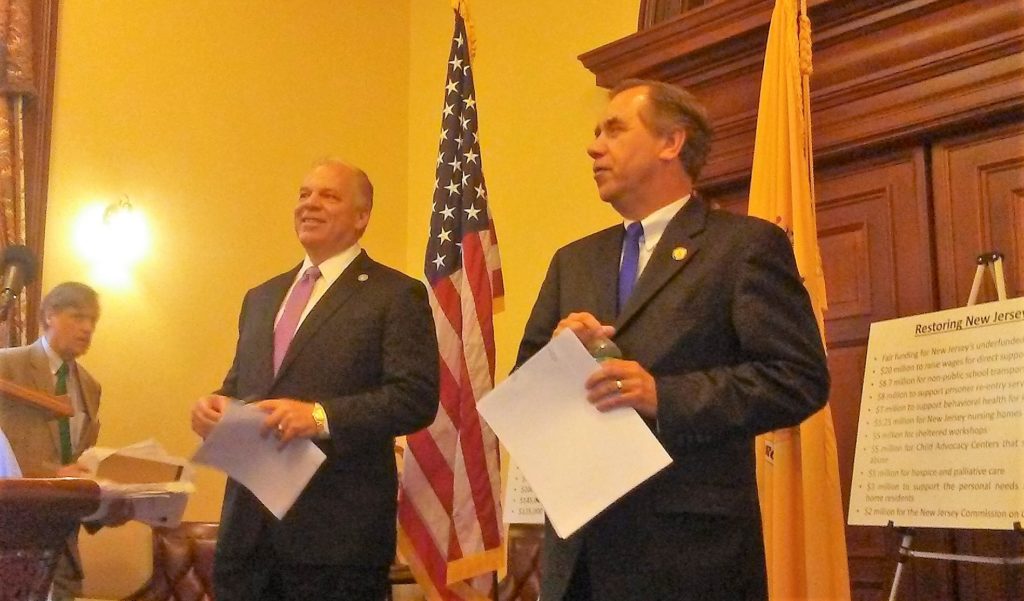Social Stumbling Blocks Haunt the Legislature's Path to a Pot of Gold

It's a fair bet that in New Jersey, when Democrats in power start talking about "diversity," they're simultaneously sticking it to minorities. In this case, marijuana legalization provided the forum in which to do damage as those same individuals used as part of a pre-Election Day human barricade in the name of social justice found themselves summarily scrapped post Election Day as that apparently unnecessary ingredient in legislative leadership's pro-business bonanza.
"We suspected everything that happened - that the bill would get pushed through without any social equity," said the Reverend Pastor Charles Boyer, pastor at Bethel AME Church in Woodbury and executive director of Salvation and Social Justice.
On Nov. 3rd, the public voted overwhelmingly in favor of legalizing marijuana: 2,737,682 (67.08%) to 1,343,610 (32.92%).
"Once they had a mandate to legalize, they would do it without dollars coming back to hard-hit communities," Boyer said.
"Then we raised hell about it," he added.
According to NJ Spotlight, "Senate President Steve Sweeney said Monday he will continue to pursue a second constitutional amendment to dedicate the lion’s share of cannabis tax revenue to social justice programs. But he and his fellow senators appear to be alone on that front. Though he reached an agreement Friday with Gov. Phil Murphy and Assembly Speaker Craig Coughlin on a bill to legalize marijuana for recreational use, neither the governor nor the speaker are supporting the Senate president’s new constitutional amendment."

Sweeney's statement came on the heels of a deal he struck with Coughlin and Governor Phil Murphy that limits to 37 the number of licenses for marijuana growers for the first two years of sales, while not imposing limits on micro-licenses for businesses with 10 or fewer employees; and dedicates 70% of revenue from a 7% sales tax, as well as all funds generated from a variable “social justice excise fee” on growers for legal aid, health care and other social programs in minority communities disproportionately affected by the drug war.
A major sticking point here is obviously the deeper meaning of the verb "to dedicate," which is apparently sufficiently vague to actually require a constitutional amendment. In other words, Sweeney himself is sheepishly admitting that lawmakers should not be taken at their word when they say they will dedicate money to the poor.
At least he's honest on that point.
"If there was a message that I'd want them to hear it's that they have do the right thing," said Boyer. "You can't say it's about social justice and then offer no social repair. You can't speak outside of two sides of your mouth."
Well, actually they can, and do, while sternly making the case for "diversity" to blanket the likes of state Senator Mike Doherty (R-23) in a pot-like haze that might provoke him into saying something socially intolerant and thereby win a headline that didn't read: "Democrats make another money grab."
In the wake of two bills coming out of two committees that threatened to devour each other - or at least threatened the dominance of one without a social justice component over the other - Sweeney attempted to look like the good guy.
Boyer wasn't biting.
"A constitutional amendment is a little disingenuous," said the pastor. "If they wanted to do it that way, that should have been question two in the last election, not a piece to throw out here in an off-year election like 2021. Let's face it. Voters tend to be more conservative in an off-year and, candidly, more white. We take a huge gamble putting a tax question out there like that. It's a fool's errand, really.
"That's not how you do justice for communities of color - by allowing white people to decide," he added.
Then again, one lawmaker, speaking on condition of anonymity, said, "look who's in charge."
"Sweeney, Coughlin and Murphy," the source groaned, referring to the three Irish Americans running Trenton.
"Is anyone surprised?" the source added, who further grumbled about the speaker wielding so much power that he just tells people what he's doing, without any apparent expectation of feedback.
The Horizon bill was a case in point.
Why generate a discussion when the votes are already there?
"Cimino runs a tight ship, sure," said the source. "But where the hell are we going?"
But we digress.
"Voters don't want any new taxes," Boyer explained. "And that's how the opponents of a constitutional amendment would describe what Sweeney wants" - which is the reason why the front office wants that Horizon deal done: $600 million for the budget in a gubernatorial election year (in addition to an estimated $300 million annually from taxing legalized pot).
But again - we digress.
That's what people do when bills contain vague and imprecise language that aims to please (political word of the millennium coming up) folks.
Like Boyer, Amol Sinha, executive director of the New Jersey chapter of the American Civil Liberties Union, expressed hope for some good to come of the meandering marijuana mishmash.
"I appreciate that the governor, the assembly and the senate came together on an agreement on tax revenue to move the process forward and that they are ostensibly committed to social justice needs," Sinha told InsiderNJ.
"But the devil is in the details," he added, urgently at this point, given the history.
"I want to know if there is sufficient flexibility in that amendment to adapt to changing needs; and I would want to know how it's going to interact with the budget process," he said. "Do we need further enabling legislation? How do we make sure we don't have to go back to the constitution to change things? Lastly, I believe we would need to reevaluate what happens if drug recognition experts are invalidated, in the event that the science shifts in a different direction."
While the parties of interest, Boyer and Sinha among them, remain hopeful that the legislature's Frankenstein monster does not tread more egregiously on pre-election expectations - or hopeful exhortations - they do harbor doubts.

When state Senator Ronald L. Rice (D-28) - chairman of the Legislative Black Caucus - tried to talk to marijuana legalization czar/Senator Nick Scutari (D-22) about decriminalization and other social justice components in the lead-up to Nov. 3rd, Scutari - a generation younger than Vietnam combat veteran Rice - literally came out of his jacket. Zero prep work resulted in cops still arresting potheads a day after the voters of New Jersey registered a 2-1 rejection of prohibition. Activists' initial efforts to land marijuana legalization on the strength of "the process" resulted in this year's ballot question, a punt that merely brought the same Longest Yard team back to the locker room with only one overriding ambition: making sure millionaires have access to licenses.
Rice shouted himself hoarse trying to get the establishment to make decriminalization the priority, create incentives to get non-millionaires to participate in a regulated market so the system doesn't continue to criminalize people, and get the tax revenue diverted back into the communities hardest hit by the drug war. One source incredulously referred to Sweeney complaining about advocates not being on board, when in September, a memo went to leadership, specifically Scutari, suggesting recommendations in the bill, none of which made it to daylight. Now, they're tangled up in two houses trying to make it look like they're concerned - by kicking the issue away to another proposed ballot question.
"They expect us to be on board with it when they haven't done the work to build that trust," a source confessed.
It didn't help when Sen. Nick Sacco (D-32) tag-teamed with the Assembly to derail a bill to end

mandatory minimum sentencing. Rabbi Elliot Tepperman of Montclair joined his colleagues at NJ Together to denounce legislative leadership's failure to serve the people.
"It is embarrassing to be a citizen in this state where all leaders agree that ending mandatory minimum sentencing for nonviolent crimes is common sense to dismantle racism, and the to watch those leaders fail to make it the law," said the rabbi.
"We're in the habit of assuming the best of everyone," he added. "Your inaction is breaking our hearts, and it needs to stop. I have faith that God works in ways [not wholly understood]. The path to justice is not always a straight line. We're here to tell you it's unacceptable to not pass this bill. Think about the thousands of faces a year to whom you're denying justice."
Amid the furor, with assembly people feeling like hostages in basement barracks, afraid to talk, worried about consolidated party machines poised to put them out of commission presumably two years ahead of legislative redistricting, Assemblyman Jamel Holley (D-20) said it's not quite completely and utterly offensive.
"In the original legislation, there was no mention of social justice or of revenues that would have to be sent back to hard-hit communities," said the lawmaker from Roselle. "The attitude was 'we want marijuana,' but there there was no mention of the sticking point pieces that have come together here.
"I'm a member who has actually lived through this," he added. "I came of age out of that era of teenage parents hardest hit. None of this was ever mentioned in the beginning. I am very, very pleased where we are at this point, pivoting the conversation that is the root of the systematic problem with marijuana. We are putting diversity into the department, micro licenses for people who actually live in the neighborhoods, and suspect in the first quarter of next year the legislature will be tweaking bills because it's a growing industry."
As for "dedicating" 70% of the revenue from a 7% sales tax to communities inn need, Holley said the 24-member Legislative Black Caucus needs to continue to assert its power to assure the money gets where it needs to go.
"If legislative leadership has not seen unison and partnership within the black caucus before, they've seen it in this discussion," said Holley. "If the 70% is even touched upon as it relates to decreasing its use in communities of need, we won't allow the budget to move.
"We have the votes and we've got the standing unity," added the assemblyman, who happens at the moment to be at odds with the state senator of his district, state Senator Joe Cryan (D-20), who's made a tentative peace with the Union County Democratic Committee Chairman, who happens to be Senator Nick Scutari (D-22).
But it should all be okay in the end, because Democrats, particularly leaders in the Democratic Party, support "diversity."






How about this tax money go to the communities where the product is sold?